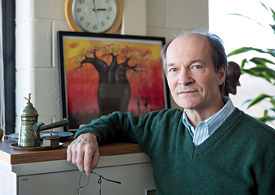If you were to look at Mark Wilson’s Web browser history, you would see lots of visits to travel sites and Google searches for “plane tickets to Ghana.”
Wilson, who has a joint appointment as a professor of ecology and evolutionary biology in LSA and professor of epidemiology in the School of Public Health, travels often. He regularly visits Malawi, Kenya, and Ghana to work on public health projects of his own and to assist Master of Public Health students in their international internships and studies.

Photo by Eric Bronson, Michigan Photography.
His international interest in epidemiology was fostered in Senegal, where Wilson lived from 1987-91 and where he met his wife, Marie-Armande. She was working as a virologist in the same lab that Wilson was using to study Crimean-Congo hemorrhagic fever and other zoonoses, or communicable diseases transmitted to humans by non-human animals. Since then, he has returned to many countries in Africa, often to study rift valley fever and malaria, and his wife often joins him.
Wilson’s connections in Africa helped him set up internship opportunities for students pursuing their MPH at U-M. Students in the international track are required to do a summer internship in a developing country, and Wilson works with them to create their experience abroad.
Ask Mark Wilson
What moment in the classroom or lab stands out as the most memorable?
During a field visit when a Malawian woman came up to me with tears in her eyes thanking me for our work there.
What can’t you live without?
New ideas and the opportunity to pursue them.
What is your favorite spot on campus?
The flagpole in the Diag. It’s where you see this diversity of people and of activities going in all different directions, and it’s a reflection, in my mind, of what a university should be about: diverse people generating new insights that are generally improving our lot as humankind.
What inspires you?
Students — that’s easy.
What are you currently reading?
Unfortunately, I’m going to have to say a textbook about epidemiology, nothing fun.
Who had the greatest influence on your career path?
An undergraduate professor of biology, James Barrow at Hiram College, who was able to excite, open, and at the same time, focus, my interest in nature.
“Sometimes things don’t go right — there’s a hurricane or civil unrest — but most students come back despite it all and say that it was the best experience of their life,” Wilson says. “The cultural exposure and interactions with the people who are part of their research is incredibly enriching and intellectually valuable.”
After serving as internship mentor for more than 150 students, sending them around the globe to work on research projects, Wilson was voted Mentor of the Year by students in his department last year. “I felt honored,” says Wilson of the award, “and I hope I can continue to inspire the next generation.”
Wilson came to U-M from Yale because he thought he would truly be able to collaborate across units here. “There’s an openness to working together and exploring problems in ways that are so much more rewarding than competing with your co-workers,” he says.
In taking advantage of the MCubed program at U-M, Wilson has been able to collaborate on evaluating the effectiveness of malaria treatment and prevention measures.
“We’re generating knowledge that should have an immediate impact on policy. we expect this research will alter availability of treatment and improve the effectiveness of it at a local and eventually national level, and that’s the ultimate goal,” Wilson says.
The weekly Spotlight features faculty and staff members at the university. To nominate a candidate, please contact the Record staff at [email protected].

